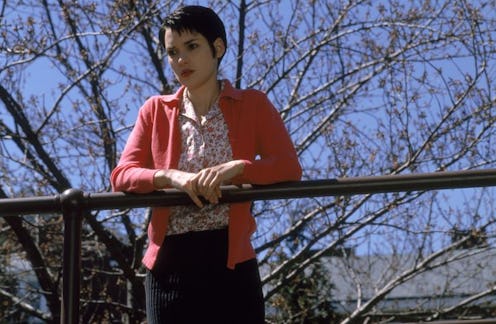
Even the sunniest, Kimmy Schmidt-iest of us can feel down in the dumps sometimes — occasionally feeling depressed because of personal problems or world events is part of the human experience, unfortunately. However, sometimes a persistently dark mood can be more than just the end product of a bad day or week — it can also be a sign that you have clinical depression, a very real mental health issue. But sometimes, figuring out whether you're actually clinically depressed or just sad about something can be surprisingly difficult.
Only a doctor can formally diagnose clinical depression. But mental health professionals have developed a set of diagnostic criteria and symptoms for depression, and checking it out can help you figure out if you need to make that doctor's appointment. The National Institute of Mental Health defines depression as a condition involving "persistent sad, anxious, or 'empty' feelings" or "feelings of hopelessness...pessimism... guilt, worthlessness, or helplessness" that "[interfere] with daily life and [cause] pain for both you and those who care about you." Depression is much more than just feeling cranky after a hard week — it's a real medical condition that doesn't just "go away on its own."
Read on to learn three signs that will help you tell depression from a bad mood — and remember, you're the only one who can tell how you really feel. Don't let friends or family members talk you into believing that you're just having a bad mood or an "off week" when you know that there's something more going on. If you are experiencing depression, you deserve to be able to get help and treatment — and you shouldn't ever feel embarrassed or ashamed about it.
1. Your Sadness Doesn't Just Go Away After A Few Days
While many of us might imagine that a depressed person feels sad all day every day, most people who struggle with clinical depression experience something called "depressive episodes" — periods of extreme depression often marked by difficulty sleeping, lack of energy and consistent feelings of hopelessness, sadness and guilt. Because a depressive episode may eventually end on its own without professional intervention, it can be easy to mistake one for a very long "bad mood."
But depression is different — while a bad mood might make you view life darkly for a little while, depression is almost like a perpetual motion machine. A bad mood is typically set off by something specific — like a break-up or a big professional setback — and will generally improve incrementally as time passes and you put distance between yourself and whatever triggered your bad mood.
But a depressive episode won't necessarily follow that same pattern; depressive episodes can be triggered by something big like a break-up, but they can also be triggered by something small, or even nothing at all. And a depressive episode doesn't typically lessen with each passing day, like a situation-related bad mood; it may stay the same, or even deepen.
So if your "bad mood" seems to be disproportionate to whatever setback you experienced, or hasn't improved after an extended period of time (the standard diagnostic criteria is often two weeks), then you may want to get in touch with your doctor to talk about whether you are experiencing a depressive episode.
2. Your Mood Can't Be Lifted With Pick-Me-Ups
Turning a regular bad mood around can often be as simple as watching a funny TV show or taking a walk through your favorite neighborhood. But clinical depression can't be walked off, waited out, conquered via the liberal application of pizza or treated using any of the other tactics we might employ to feel better after a bad day.
Since depression is a disease, rather than a rational reaction to negative events in your life, it can't generally be cured by introducing positive events into your life — so it can't be fixed with treats or fun any more than a heart murmur could be treated with an ice cream sundae and a Blu-Ray of Runaway Bride. In fact, a loss of interest in the things you used to enjoy is one of the most common symptoms of clinical depression.
People with clinical depression typically require help from a mental health professional — treatments for depression can involve medication, talk therapy, cognitive behavioral therapy, or a combination of any of these methods — rather than just positive stimulation in order to feel better. So if the things that normally lift your mood now make no dent at all, it's worth looking into whether you might be suffering from depression.
3. You Feel Physically Bad
Not everyone who experiences depression has physical symptoms, of course — but many sufferers report that their depressive episodes are accompanied by changes to their appetite, sleeping patterns and sex drive. Many depressed people also experience headaches, stomachaches, random pains, digestive issues and even feelings of sluggishness so intense that it can be difficult to move. So if you feel physically sick on top of feeling sad, hopeless or emotionally distraught, but know that your aches and pains don't seem to have a physical cause, consider whether this might be more than just a bad mood.
Even if all these things sounds familiar, that doesn't mean that you have depression — but if you do, there's no need to feel hopeless about it, because you're definitely not alone. Every year, 14.8 million people in the U.S. experience depression — that's 6.7 percent of the population, which makes it one of the most common health afflictions in the country. So if you are feeling these symptoms right now, or have just been feeling low lately, don't feel ashamed about finding a doctor to talk with about your mental health —so much help is available, and you'll feel so much better once you get it.
Images: Columbia Pictures, Giphy (3)